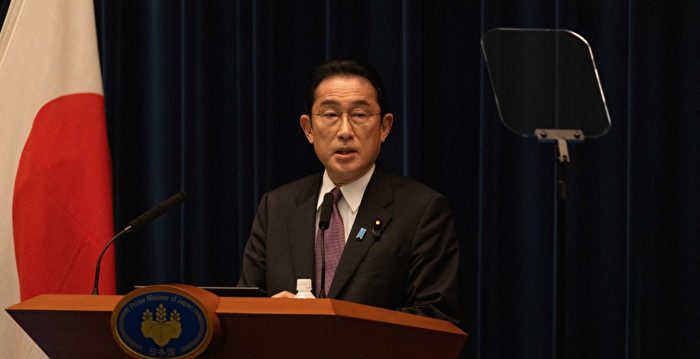[Epoch Times March 21, 2022](The Epoch Times reporter Chen Ting comprehensive report) Japan’s tough response to Russia’s invasion of Ukraine broke years of practice, and the conflict could reshape Tokyo’s defense strategy , making Japan more robust to the CCP’s regional ambitions.
Agence France-Presse pointed out that when Russia invaded Ukraine in 2014, Japan’s response was much less drab. In the face of this invasion, however, Japan has cooperated with Western countries like never before, quickly unveiling sanctions, making tough rhetoric, and even sending non-lethal military aid to Ukraine.
The crisis has brought to the fore a debate about increasing defense spending and expanding military capabilities in a country whose constitution says the military should be used only for defense.
Valerie Niquet, an Asia expert at the French think tank the Foundation for Strategic Studies (FRS), said: “Japan has been accused of spending money before, and to a certain extent, Japan was only willing to contribute money and not directly participate in any crisis.”
This time, she said, Tokyo “puts a lot of emphasis on what they’re doing…to show that they’re not just sitting on the sidelines and waiting for things to unfold.”
Tobias Harris, a senior fellow at the Center for American Progress, a Washington-based think tank, said Tokyo’s speed in unveiling measures such as individual sanctions was “pretty remarkable.”
“This is going further than I imagined the Japanese government to go,” he said.
Agence France-Presse believes that although there are other reasons, such as the specificity of this conflict and the years of stalemate between Japan and Russia on the territorial disputed islands, that make Japan more willing to oppose Moscow’s actions, but the most important reason is obviously that the CCP. Growing ambitions in the Indo-Pacific.
In the past, Japan feared that tough action against Russia would push Moscow toward Beijing, said James DJ Brown, an associate professor of political science at Temple University in Tokyo.
“Now, that has been completely reversed,” he told AFP.
Instead, it was argued that “Japan must be tough on Russia or it will set a precedent and possibly encourage China to think it can do the same”.
According to the South China Morning Post, Japan’s former foreign minister and Liberal Democratic Party propaganda chief Taro Kono said last week that Japan’s sanctions against Russia were necessary, even if it could affect energy supplies. Because Tokyo may one day need allies to fight the CCP.
“We need to tell the Japanese people that in order to protect ourselves, we also need to help others,” Kono said. “If there are any acts of aggression anywhere on this planet, we need to stop them.”
Over the weekend, Japanese Prime Minister Fumio Kishida also urged Indian Prime Minister Narendra Modi to take a tougher stance on Russia. Currently, India is the only country in the Quartet that has not strongly condemned Russia. Russia has been India’s main arms supplier since Soviet times.
The Ukraine crisis may also make more Japanese support for increased defense spending.
In last year’s election campaign, the ruling Liberal Democratic Party set a long-term goal of raising the defense budget to more than 2 percent of GDP, up from 1 percent in the past.
Brown believes that this has become a pushable reality after the outbreak of the Russian-Ukrainian war.
Harris also said: “For people who want Japan to strengthen its defense, the picture flowing out of Ukraine is very useful.”
Some lawmakers, including former Prime Minister Shinzo Abe, have suggested considering the possibility of “nuclear sharing,” which is the deployment and joint use of U.S. nuclear weapons within Japan. Currently, Japan, while relying on the U.S. nuclear umbrella, has a policy that prohibits Japan from producing, possessing or trusting nuclear weapons.
In general, the Japanese government’s response to the Ukrainian conflict is well supported by the Japanese people.
According to a telephone survey released by Kyodo News on Sunday (March 20), nearly 86 percent of respondents supported Japan’s sanctions against Russia, while 91.2 percent supported the Japanese government’s decision to admit Ukrainian refugees.
At the same time, the approval rating of the Kishida cabinet rose by 3.5 percentage points from the February poll to 60.1%. This shows the public’s support for Kishida’s firm stance on Moscow.
In addition, in the face of the Russian invasion, 75.2% of the respondents said they were worried that China might be influenced and try to forcibly seize Taiwan and the Diaoyu Islands (known as the Senkaku Islands in Japan).
Some scholars believe that the impact of the Ukraine crisis on Japan’s national defense strategy is still fermenting.
“I don’t think we’ve fully seen the impact of this war on discussions within Japan,” Harris said.
Responsible editor: Ye Ziwei#
